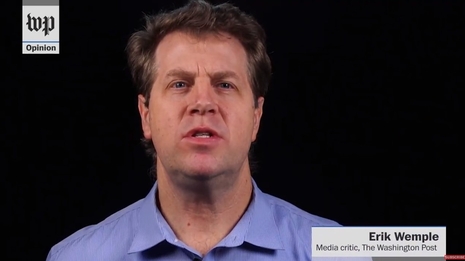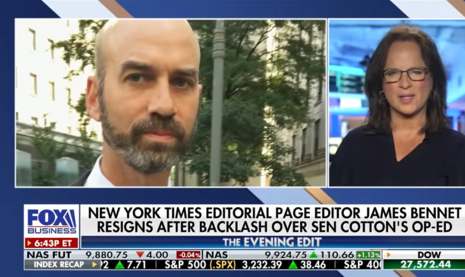 Erik Wemple, media critic at the Washington Post, issued a fascinating and revealing mea culpa on October 27, regarding the disgraceful firing in the summer of 2020 of former New York Times editorial page editor James Bennet, after Bennet ran an op-ed by Republican Sen. Tom Cotton that suggested sending in troops to quell the rioting stemming from Black Lives Matter protests after the police killing of George Floyd. The blunt headline: “James Bennet Was Right.”
Erik Wemple, media critic at the Washington Post, issued a fascinating and revealing mea culpa on October 27, regarding the disgraceful firing in the summer of 2020 of former New York Times editorial page editor James Bennet, after Bennet ran an op-ed by Republican Sen. Tom Cotton that suggested sending in troops to quell the rioting stemming from Black Lives Matter protests after the police killing of George Floyd. The blunt headline: “James Bennet Was Right.”
The essay uses Bennet’s own thoughts, as relayed to media reporter Ben Smith in October.
Wemple relayed Bennet's shameful treatment by Times Publisher A.G. Sulzberger, as told to Smith: “He set me on fire and threw me in the garbage and used my reverence for the institution against me."
Wemple reacted by putting 100% of the blame on the Times, both its vengeful woke staff and its cowardly administration:
That might sound like the angst of a guy who’s still disgruntled at losing his job. And it is, for a compelling reason: Bennet is right. He’s right about Sulzberger, he’s right about the Cotton op-ed, and he’s right about the lessons that linger from his tumultuous final days at the Times.
He also set up a personal mea culpa:
It’s also long past time to ask why more people who claim to uphold journalism and free expression -- including, um, the Erik Wemple Blog -- didn’t speak out then in Bennet’s defense.
It’s because we were afraid to.
 There was indeed intense media peer pressure to condemn Cotton’s op-ed, published June 3, 2020, in the aftermath of the BLM rioting. There was immediate “backlash…with Times staffers at the forefront of the critique.” Times staffers even claimed: “Running this puts Black @NYTimes staff in danger.”
There was indeed intense media peer pressure to condemn Cotton’s op-ed, published June 3, 2020, in the aftermath of the BLM rioting. There was immediate “backlash…with Times staffers at the forefront of the critique.” Times staffers even claimed: “Running this puts Black @NYTimes staff in danger.”
Wemple noted “an astonishing up-is-down moment,” where Times management didn’t try to defend the paper’s product, but instead “scrambled to pulverize the essay in order to vindicate objections rolling in from Twitter.” The editors even commissioned a post-mortem fact-check, hoping to find egregious errors not uncovered in the original review, to justify its post-publication condemnation of the op-ed.
Wemple brought withering sarcasm to discussion of the Times' ideologically based revisionism.
Other critiques from the editor’s note included that the essay needed “further substantial revisions”; that it contained an “overstatement” about police bearing the “brunt” of the rioting; that the tone was “needlessly harsh”; that more context was necessary; and that an Oxford comma was misplaced.
Okay, that last one is a joke.
Yet a more pathetic collection of 317 words would be difficult to assemble….
Wemple didn’t spare himself either.
Our criticism of the Twitter outburst comes 875 days too late. Although the hollowness of the internal uproar against Bennet was immediately apparent, we responded with an evenhanded critique of the Times’s flip-flop, not the unapologetic defense of journalism that the situation required. Our posture was one of cowardice and midcareer risk management. With that, we pile one more regret onto a controversy littered with them.





